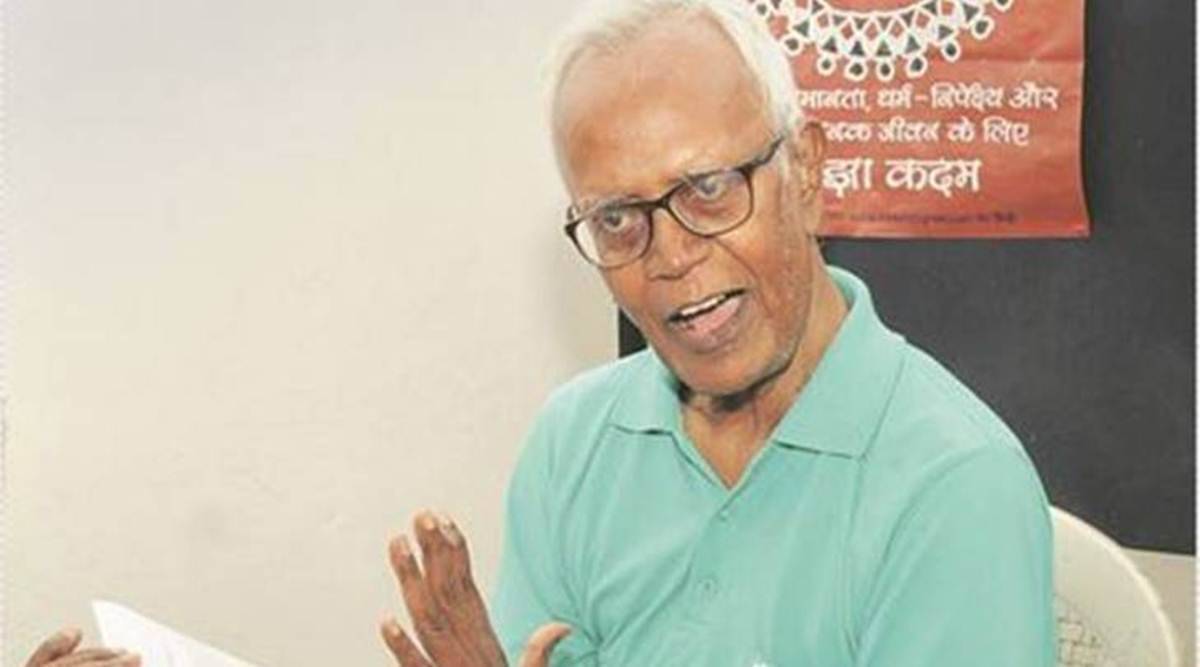Swamy is the founder of Bagaicha, an organisation working with tribals in Jharkhand on issues that include alleged illegal detention of youngsters on charges of being Maoists.
Father Stan Swamy, a Jesuit priest and tribal rights activist arrested by the National Investigation Agency (NIA) in the Elgaar Parishad case, on Thursday filed a bail application before a special court, saying no purpose was served by “keeping a sick 83-year-old incarcerated”.
Swamy was arrested on October 8 in Jharkhand and produced in a Mumbai court the following day. The NIA, however, did not seek his custody for investigation and filed a chargesheet against him and seven others the same day. He has since been lodged in Taloja Central Jail after his interim bail application on medical grounds was rejected last month.
Calling the arrest “uncalled for” and “malafide”, the bail plea says that the fact that his custody was not sought over two years after the FIR was filed shows that he was not considered a flight risk or someone who would tamper with evidence.
The 31-page bail plea, filed through his lawyer Sharif Shaikh, says Swamy has been targeted by the investigating agency due to the “nature of his writings and work” about “caste and land struggles of the people in India and violation of the democratic rights of the marginalised citizens of India”. “Through his literature, he has raised questions and holds the state authorities responsible for the injustice against the marginalised persons of society… it is due to the nature of the work that he is being falsely implicated in the said FIR,” it states.
The bail application claims that while the NIA alleges his links with Maoist groups based on some documents found on his laptop, the format in which the documents are found can be “easily manipulated and planted on an insecure digital divide”.
Referring to the letters annexed to the NIA chargesheet, the bail plea says there was nothing incriminating to show his involvement in any terrorist activity.
“The region (Jharkhand) is torn in conflict between the State and Naxalites. At most the prosecution has managed to establish that the applicant had some correspondence with others who could be members of banned organisation. Nowhere have they been able to establish that the applicant himself is a member of the banned organisation. Working for the undertrials who could or could not have been Maoist does not make the applicant himself a Maoist,” it says.
Swamy is the founder of Bagaicha, an organisation working with tribals in Jharkhand on issues that include alleged illegal detention of youngsters on charges of being Maoists. He is also a member of Persecuted Prisoners Solidarity Committee (PPSC), which the NIA claims is a frontal organisation of the banned CPI(Maoist) group.
In its chargesheet against Swamy, the NIA had said: “Since from the maximum part of the country, party members (of CPI-Maoist) were arrested and the party was not having any face, so it gave responsibility to Stan Swamy as he was against the government. Stan Swamy is having his own identity. Stan Swamy is having his own NGO in Jharkhand.”
Swamy’s bail plea says the NIA failed to bring on record anything that shows he was supporting the banned organisation through PPSC. “The role of PPSC has been established, admittedly by the prosecution, as an organisation providing legal aid… Nowhere does the Constitution states that alleged Maoists are not to be allowed an opportunity to defend themselves,” it says.
The bail plea also says that Swamy was not connected to the organisation of the Elgaar Parishad event on December 31, 2017, which the NIA claims was linked to the violence in Bhima Koregaon the next day. Asking the NIA to file its reply to the bail plea, the court fixed December 4 as the next date of hearing.
Source: Read Full Article


